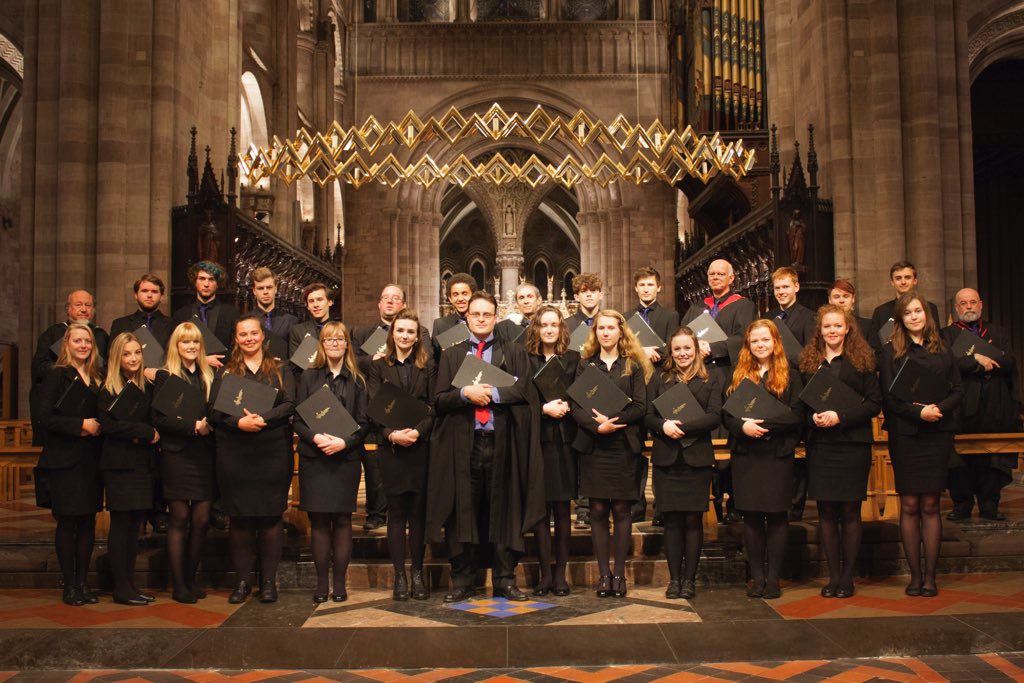4 February, 2017
For Immediate Release
ESO Open 2017 Shirehall Sunday Series with Vivaldi, Bach and Telemann featuring Academia Musica Choir

The English Symphony Orchestra, hailed as the International Orchestra of Elgar Country, kick off their 2017 series of very popular Shirehall Sunday concerts at 3:30 Pm on the 19th of February with a programme of Baroque favourites by Bach, Vivaldi and Telemann. The ESO are joined on this occasion by the outstanding Scholars Choir of Hereford Sixth Form College, Academia Musica, and a top-flight team of local and national soloists, including Lucy Bowen, Caitlin Prowle, Emma Curtis, Jon Weller and Matthew Sharp. The concert will be conducted by the ESO’s Principal Conductor and Artistic Director, Kenneth Woods.
The Academia Musica choir continue to go from strength to strength. In addition to their weekly evensongs at Hereford Cathedral, a number of exciting concerts are planned for 2017. Aryan Arji, Director of Music of Academia Musica said, ‘It is a privilege to perform on a regular basis with this great orchestra with whom we now have a well-established partnership.”
Kenneth Woods, Artistic Director, says the relationship between the ESO and Academia is a special one. “Since we first started working together a few years ago, the ESO and Academia Musica have collaborated on several really important projects- tours to London, world-premiere performances. They’re a wonderful, spirited and polished choir, and there’s always energy when we work together. Doing this very uplifting music of Bach and Vivaldi promises to be a particularly rewarding collaboration.”
The ESO are one of the region’s most active proponents of music education, offering regular orchestral courses in addition to the work they do in partnership with regional music hubs and groups like Academia Musica, which give young musicians a chance to perform as colleagues with leading professionals. Hereford audiences can sample the achievements of the ESO Youth Orchestras and young guest musicians from around Herefordshire in a free pre-concert youth performance at 3PM. The assembled youngsters will showcase the result of their recent work on ESO courses with a performance including the world premiere of a new work written just for them by the ESO’s acclaimed composer-in-association, Philip Sawyers, conducted by James Topp.
In addition to their busy concert schedule and work in support of music education as Orchestra in Residence of Herefordshire, the ESO also present an uplifting series of dozens of concerts in care homes and hospices across the county, bringing the comfort of live music to people living with dementia.
2016 was a landmark year for the ESO. The orchestra is currently enjoying a major artistic resurgence, having recently released their first full-length CD in over 10 years- a recording of Krenek Piano Concertos which won a string of five-star reviews and landed on the Sunday Times Best Recordings of 2016 list. 2016 also saw the release of the ESO’s recording of the Elgar Piano Quintet as arranged for symphony orchestra by Donald Fraser- a recording which became Disc of the Month on Classic FM and a one of the year’s best-selling CDs. Other highlights of 2016 include winning Classical Music Magazine’s “Premiere of the Year” accolade for the second year in a row and a stream of international broadcasts.

[ENDS]
PROGRAMME INFORMATION
Sunday 19 February 2017 at 3:30 PM
Hereford Shirehall
Part of ESO Shirehall Sundays
English Symphony Orchestra
Kenneth Woods- Principal Conductor
Academia Musica Choir- Aryan Arji, director
Lucy Bowen- soprano
Caitline Prowle- soprano
Emma Curtis- contralto
Jon Weller- tenor
Matthew Sharp (ESO Artist-in-Association)- bass-baritone
Programme:
Vivaldi- Gloria RV589
Telemann-Ouverture-Suite, ‘”Burlesque de Quixotte”
‘Bach- Cantata no. 140 “Wachet auf, ruft uns die Stimme”
TICKETS- https://esobachintown.eventbrite.co.uk/
Book by phone via Worcester Live- 01905 611427
£18/general admission, £22/premium seating, £5/children age 5-18
Booking charges may apply
More about the ESO: http://eso.co.uk/
More about Kenneth Woods: http://kennethwoods.net
More about Matthew Sharp: http://www.matthewsharp.net/
More about Emma Curtis: http://www.emmacurtis.com/
Interview requests, additional materials and images: Melanne Mueller <melanne@musiccointernational.com>


